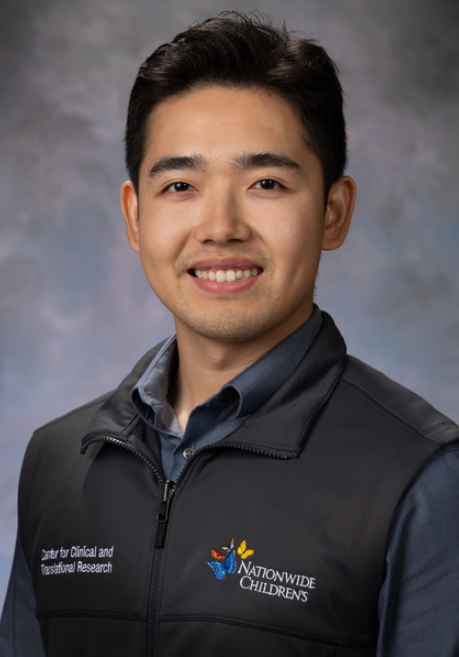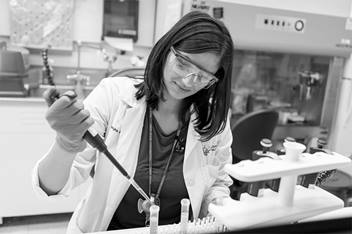Brigstock Lab
The Brigstock Lab’s primary focus is on fibrosis, a pathological process in which excessively large amounts of collagenous scar material are deposited between cells of major organs and tissues. This process usually develops over a protracted time period (frequently measured in years) and is most often a response to chronic injury. Fibrosis is a common feature of numerous varied organ diseases in which it causes impairment of cell-cell communication, aberrant tissue remodeling, alterations in blood flow, reduced tissue or organ function, and increases the probability that more severe chronic conditions such as end-stage organ disease or cancer will develop.
Fibrosis is the cause of considerable morbidity and mortality and has been estimated to contribute to 45% of all deaths in the United States, yet there are currently no FDA-approved therapeutics for most forms of fibrosis.
Pathways of fibrosis involve multiple cell types which communicate in an orchestrated fashion via intercellular signaling networks that involve numerous cell-associated, matricellular or soluble signaling molecules.
In recent years, a new mode of cell-cell communication has been identified that involves the delivery of molecular information in extracellular vesicles (EV). This is now considered to be a significant signaling mechanism by which many homeostatic and pathological processes are regulated. Emerging evidence shows that specific populations of EVs are stimulatory for fibrosis or may possess intrinsic or engineered anti-fibrotic properties; these are the main aspects of EV biology that we are investigating.
The Brigstock Lab researches fibrosis of the liver, which is a common feature of alcoholic liver disease, non-alcoholic liver disease, viral hepatitis, liver cirrhosis and cancer. Using in vitro systems to study the involvement of EVs in communication between liver parenchymal cells (e.g. hepatocytes) and non-parenchymal cells (e.g. hepatic stellate cells, macrophages, endothelial cells), the lab’s team aims to identify molecules in EVs that can drive or suppress fibrogenic pathways, or that are important for EV release or that mediate binding between EVs and their target cells. It is also using hepatic fibrosis models in mice to determine the pro-fibrotic or anti-fibrotic actions of specific sub-populations of EVs. The elucidation of fibrogenic mechanisms at the molecular level will likely result in the identification of many rational therapeutic targets, and an improved understanding of EV in fibrosis will likely result in additional therapeutic advances.
Lab Staff

David R. Brigstock, PhD
Principal Investigator
David.Brigstock@NationwideChildrens.org
David Brigstock, PhD, received his doctorate degree from Cambridge University and conducted his postdoctoral studies at Harvard Medical School and Children’s Hospital, Boston. He was recruited to Nationwide Children’s and The Ohio State University in 1991, where he has maintained an active lab funded by the National Institutes of Health (NIH) since. Dr. Brigstock’s junior and mid faculty career focused on the biochemistry and biology of cell communication network factor 2 (CCN2; connective tissue growth factor (CTGF)), including its role as pro-fibrotic factor in the liver.
Currently a professor of Surgery at OSU, Dr. Brigstock has a major interest in how EVs contribute to fibrosis during chronic liver injury. He is a fellow of the American Association for the Study of Liver Diseases, a fellow of the Royal Society of Biology and a standing member of the AA-1 Biomedical Research study section at the National Institute on Alcohol Abuse and Alcoholism.

Sherri Kemper
Research Associate
Sherri.Kemper@NationwideChildrens.org
Sherri Kemper graduated cum laude with a bachelor’s degree in biochemistry from Duquesne University in Pittsburgh. She joined Dr. Brigstock’s lab, where she is currently a research associate, in 1998. Sherri’s main lab duties include ordering supplies, maintaining transgenic mouse colonies and undertaking critical cell and molecular biology experiments. Her research was initially focused on the role of connective tissue growth factor (CTGF) in liver fibrosis. More recently, it has involved the study of extracellular vesicles (EVs) in inflammatory or fibrosing liver injury. Sherri is responsible for mass-scale cell culture and isolation and characterization of various populations of EVs from several liver cell types.

Xinlei Li, PhD
Research Scientist
Xinlei.Li@NationwideChildrens.org
Xinlei Li, PhD, is a research scientist in Dr. Brigstock’s lab. Dr. Li earned his doctorate degree in biochemistry and molecular biology at University of Chinese Academy of Sciences. His doctorate thesis and post-doctoral studies focused on molecular virology and virus-host interactions of hepatotropic viruses. Since joining Dr. Brigstock’s group in 2018, Dr. Li has led studies of the role of EVs in mediating communication between parenchymal and non-parenchymal cells of the liver. This work is important for understanding the pathogenesis of inflammatory such as alcoholic liver disease and nonalcoholic fatty liver disease and has also resulted in novel EV-based therapeutic approaches for hepatic fibrosis.

Guanqi Zhao, PhD
Postdoctoral Scientist
Guanqi Zhao joined Dr. Brigstock’s lab as a postdoctoral scientist in August 2025. He earned his doctoral degree in microbiology and cell science from University of Florida. His doctoral research was centered on host pathogen interaction and immunology, with a particular focus on how commensal bacteria–derived extracellular vesicles (bEVs) modulate host immune responses during norovirus infection. His current role in Dr. Brigstock’s lab involves designing and establishing an ethanol-inducible system to track hepatocyte-derived extracellular vesicles (EVs) in liver organoids and further elucidating the therapeutic mechanisms of hepatocyte EVs in various liver cell targets.



